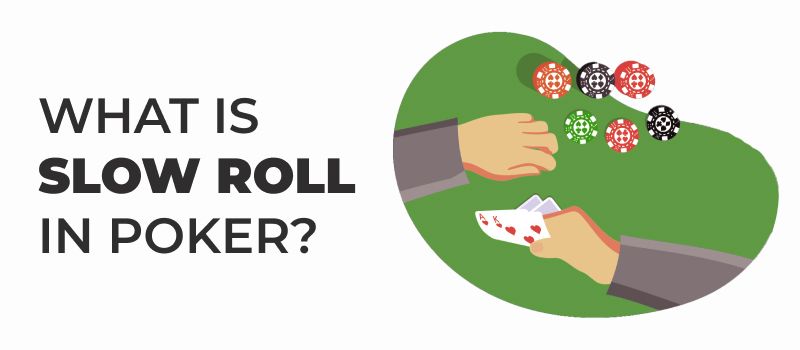Slow rolling in poker can be a nerve-wracking experience and is often seen as quite toxic. Many players regard it as disrespectful to their opponents, as it builds unnecessary tension before finally revealing one's cards. Some players, however, might use it as a psychological ploy to apply pressure during play and cultivate a reputation as a formidable competitor. In this article, we will analyze the psychological factors behind slow rolling in poker and offer valuable strategies that you can implement. Canadian casinos .
What does slow rolling mean in poker, and how can you steer clear of it?
What is Slow Rolling In Poker?

This tactic involves purposely delaying the disclosure of your winning hand when you're certain no other player can beat it. Typically, this occurs at the end of a betting round when everyone is ready to reveal their cards. Instead of showing their winning hand immediately, the player will take their time, which heightens the anticipation and anxiety among their fellow competitors.
There are various methods for executing a slow roll—some individuals opt for an infuriating smirk, while others engage in a toxic act of pretending to have lost, only to reveal that they actually won.
Why is Slow roll a bad tactic?
Despite the fact that a few players might enjoy this approach, many avoid it since they recognize the frustration it can cause for others. Here are four reasons explaining why slow rolling is often seen as unacceptable:
It is disrespectful to your opponent.
By engaging in a slow roll, you imply to your opponent that they don’t deserve an expedient and straightforward reveal, which can come off as discourteous and pompous. While poker is undoubtedly a game relying on skill and strategy, maintaining a spirit of sportsmanship is crucial.
It can backfire on you.
Though slow rolling might offer a fleeting sense of superiority, it can adversely affect how your peers perceive you throughout the remainder of the game. Additionally, regardless of how confident you may feel about your hand, there is no guarantee about the cards your opponent may be holding.
It goes against the spirit of the game.
Engaging in slow rolling contradicts the fundamental principles of integrity that poker embodies and can lead to a tense environment at the table. It detracts from the genuine essence of poker, which focuses on outwitting opponents through strategy and skill, not through discourteous behavior.
This behavior has the potential to spoil the overall enjoyment for everyone involved.
It’s not merely the excessive pressure that can annoy fellow players, but also the additional time consumed for all individuals at the table. Consistent slow rolling can tarnish the friendly nature of the game by demonstrating a lack of consideration for others' time.
How to Recognize the Use of Slow Roll?
Identifying a slow roller at your poker table can be done through various signs. Below, we’ve put together several tips to help you recognize one.
Frequent Card Checks. If you observe a player repeatedly glancing at their cards, it could indicate they have a strong winning hand, leading to a potential slow roll.
General Conduct. Certain behavioral traits, including sarcastic remarks, prolonged silences, or extended eye contact, can help you spot a slow roller, so pay attention to the overall demeanor of the players.
Emotional Manipulation. Players who slow roll often seek to influence your emotions by taking longer to reveal their cards or bluffing, as well as by provoking you through expressions or verbal exchanges.
Last to Show Hand. If a player consistently reveals their hand in the final position, this can also indicate a tendency to slow roll.
A Famous Slow Roll Example
This instance is one of the most well-known clips circulating online, exemplifying how slow rolling can lead to disastrous outcomes.
During the Irish Open, only eight players remained at the final table, each having battled through a significant number of competitors to secure a noteworthy cash prize and a chance at a prestigious title.
Andreas Gann had flopped an ace-high flush with the king of diamonds, commonly referred to as 'the nuts.' His rival, renowned Irish poker player Donnacha O'Dea, had flopped two pairs. It was widely expected that the money would find its way to the pot in a heads-up confrontation, and indeed, O'Dea initiated the action, pushing Gann all in.
For some inexplicable reason, Gann took nearly a minute to make his decision before he finally called.
However, justice was about to unfold. O'Dea managed to improve his hand on the river, making a Full House and sending Gann out of the tournament.
Commentators at that time stated, 'This is absolutely disgraceful.' You can view the clip below.
Help us to 100K Subscribers - http://goo.gl/Bvsafo If you are reading this, comment.. ● Watch other Videos: ► Bluffs Gone Wrong - https://youtu.be/ffawyLHW4fY ► Phil Ivey Wins $2,200,000 - https://youtu.be/GvSFls_LtkA ► Top Straight Flushes - https://youtu.be/XEe3LCL34Tg ► Best Poker Quads - https://youtu.be/NaA4CsAzdNM
Slow rolling VS Hollywooding
Often, slow rolling is confused with a technique called Hollywood-ing, yet the two methods are significantly different. Read on to uncover the essential distinctions.
Slow Rolling
- Slow rolling can only take place during the showdown and has no effect on the game’s outcome.
- It often breeds frustration and irritation among other players at the table.
- It is regarded as one of the most disrespectful actions one can commit in poker.
- Less common in professional games.
- It can harm a player’s reputation within the gaming circle.
Hollywooding
- Players typically embellish their decision-making as part of a bluff.
- Slow playing can occur at any phase of a hand, misleading others if performed skillfully.
- It is considered bad form only when done persistently and without genuine intent.
- Slow playing is a valid strategic maneuver that can influence the game’s outcome.
- If executed well, it can bolster your confidence and enhance your reputation at the table.
Summary
In conclusion, slow rolling in poker refers to the deliberate delay in revealing a winning hand, which often leads to intense disagreements. Some players interpret this behavior as detrimental to the game’s integrity, while others view it as a clever psychological maneuver. Thankfully, in the realm of online gaming, this behavior is absent from live poker settings and games based on random number generation, fostering a more relaxed atmosphere. Utilize our Canadian online casino reviews to find trustworthy sites that offer safer and fairer gaming experiences.
FAQ
Is slow rolling against the official rules of poker?
No, slow rolling isn’t explicitly banned by the rules of poker; however, it is deemed to be poor etiquette that goes against the unwritten principles of good sportsmanship.
Is Slow Rolling Ever Acceptable?
While poker rules may allow it, professional players typically frown upon slow rolling. This behavior is more prevalent in informal settings.
What are the repercussions of slow rolling?
Typically, players who engage in slow rolling do not receive friendly feedback from their peers, as they cause everyone to wait, which can severely damage their reputation at the table.
Why Do Players Slow Roll?
This tactic usually manifests when a player holds a strong hand and is confident in their victory, unnecessarily drawing attention to their position at the table. Conversely, it can also occur when a player has lost and is merely trying to annoy others to apply added pressure.
What differentiates slow rolling from slow playing?
While slow rolling is a tactic used to mock and provoke opponents, slow playing is a more calculated strategy aimed at deceiving other players and extracting additional value.
Should You Use The Slow Roll In Poker?
It’s crucial to uphold good sportsmanship; avoiding slow rolling is essential to maintain respect and a positive atmosphere among players.











